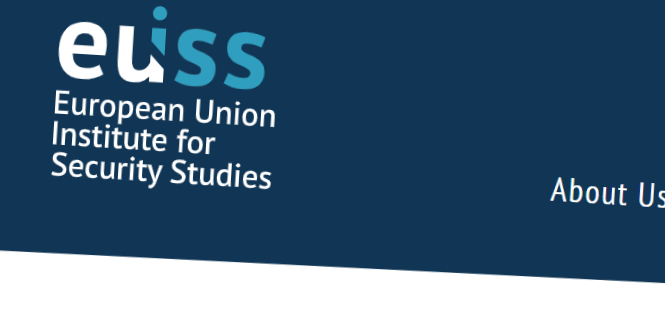(18 April 2024 – EUISS)
MODERATOR:
- Amaia Sanchez Cacicedo, Associate Analyst for South Asia
SPEAKERS :
- Kanti Prasad Bajpai, Professor and Wilmar Chair in Asian Studies at Lee Kuan Yew School of Public Policy
- Rohan Mukherjee, Assistant Professor of International Relations, LSE
The aim of the conference organized by the European Union Institute for Security Studies (EUISS) was to delve into the normative dimension underpinning the relationship between the European Union and India. Led by Amaia Sanchez-Cacicedo, with Kanti Bajpai, and Rohan Mukherjee, the discussion sought to illuminate how the worldviews and normative red lines of these two actors influenced their cooperation. Drawing from the Chaillot Paper titled “EU-India Relations – Gaining Strategic Traction?” published by EUISS, the discussion navigated through the divergences and convergences between the EU and India, particularly focusing on their normative approaches.
Understanding fundamental differences
The article “EU and India Diverging Worldviews: Is Cooperation Possible?” highlighted the fundamental disparities between the EU and India regarding key issues such as global governance, multilateralism, and security. For instance, while the EU tends to favor institutionalized multilateralism and the promotion of international institutions, India takes a more pragmatic approach, as seen in its support for forums like BRICS, where it seeks to promote its national interests alongside international initiatives. A concrete example of this divergence lies in the debate over reforming the United Nations Security Council, where the EU often advocates for increased representation for both permanent and non-permanent members, whereas India, as a potential permanent member, has different priorities and perspectives on the matter. This underscores potential challenges for bilateral cooperation between the EU and India, especially in areas where their strategic interests may differ.
However, despite these differences, there are points of convergence on issues such as democracy, human rights, and multilateralism. For instance, both actors have collaborated on initiatives to promote democracy and human rights globally, including through political dialogues and development programs. By highlighting these areas of mutual interest, the EU and India can overcome some of the divergences in their perspectives and work together to achieve common goals.
Is cooperation possible?
Kanti Bajpai’s insights shed light on potential avenues for cooperation between the EU and India, despite their inherent differences. One concrete example where collaboration is possible is in combating terrorism. Both entities have faced terrorism threats and share an interest in addressing this global challenge. They could collaborate on intelligence sharing, capacity building, and joint counter-terrorism operations to enhance their collective security. Additionally, promoting trade and investment offers another opportunity for cooperation. Both the EU and India are major economic players with significant trade and investment ties. By fostering closer economic relations, they can stimulate growth, create jobs, and enhance prosperity for their citizens. This could involve initiatives such as negotiating trade agreements, facilitating investment flows, and promoting business partnerships between companies from both regions. Furthermore, addressing global challenges like climate change offers another area for collaboration. According to Kanti Bajpai, both the EU and India have committed to tackling climate change and reducing greenhouse gas emissions. They could collaborate on clean energy projects, technology transfer, and capacity building to transition to a low-carbon economy. This would not only contribute to mitigating climate change but also promote sustainable development and environmental protection.
While challenges may exist, such as in sensitive areas like trade and security, Bajpai emphasized the importance of open dialogue and creative problem-solving. By engaging in constructive discussions and exploring innovative solutions, the EU and India can overcome these obstacles and build stronger, more resilient partnerships for the future.
Shaping norms
In exploring the role of the EU and India as actors seeking status and shaping norms, it’s evident that their differing approaches to international norms can present both challenges and opportunities for cooperation. For example, the EU’s preference for an institutionalized and regulated approach to norms often aligns with its commitment to upholding human rights, democracy, and the rule of law. This approach is reflected in the EU’s engagement with international organizations and its advocacy for global norms and standards in areas such as trade, climate change, and human rights. Through its normative power, the EU seeks to influence global governance and promote its values on the international stage. On the other hand, India’s pragmatic stance is shaped by its focus on national interests and sovereignty. While India also adheres to values such as democracy and the rule of law, its approach to norms tends to be more flexible and context-specific, as explained by Rohan Mukherjee. India prioritizes its strategic autonomy and seeks to safeguard its national interests while navigating the complexities of the international system. This pragmatism allows India to adapt its approach to norms based on evolving geopolitical dynamics and domestic priorities. Despite these differences, there are areas where the EU and India can find common ground and collaborate effectively. For instance, both actors share a commitment to promoting human rights, democracy, and the rule of law. By exploiting their shared values, the EU and India can work together to address common challenges such as climate change, terrorism, and global health crises. This could involve joint initiatives to promote sustainable development, strengthen democratic institutions, and advance human rights protections.
Moreover, fostering open dialogue and mutual understanding is essential for building trust and cooperation between the EU and India. By engaging in constructive exchanges and acknowledging each other’s perspectives, both actors can overcome differences and forge stronger partnerships. This approach ensures that cooperation between the EU and India is grounded in mutual respect and shared objectives, leading to more effective and sustainable outcomes.
The event was live-streamed on LinkedIn and is available to re-watch on the platform.

